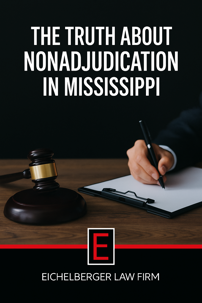If you're facing criminal charges in Mississippi, you may have heard the term "nonadjudication" or "non-adjudicated probation" thrown around. It's an important concept to understand, and I want to break it down for you in plain language so you know what it means and how it could apply to your situation.
What Happens in a Normal Plea Agreement
To understand nonadjudication, it helps to start with what normally happens when someone changes their plea from not guilty to guilty—what we call the plea colloquy in legal terms.
Typically, the process goes like this: someone enters a guilty plea before a judge, and the judge accepts that plea. Then the judge adjudicates them guilty and hands down a sentence. That's the standard way it works.
How Nonadjudication Is Different
With nonadjudication, things take a different path. When you go before the judge and express that you want to change your plea from not guilty to guilty, here's what can happen instead of the traditional outcome:
The judge can say, "I understand you want to plead guilty, but I'm not going to accept your plea of guilty. Instead, I'm going to place you on non-adjudicated probation."
What does that mean? You're placed on probation—just as if you had been convicted. You have to abide by all the terms set by the court. You may have to pay fines or restitution. You might have other conditions you need to meet. In practical terms, your daily life looks very similar to what it would after a conviction where you are sentenced to probation.
But here's the crucial difference: you are not found guilty.
The Key Benefit: Your Record Stays Clean
This is where nonadjudication becomes valuable. If you successfully complete all the terms of your non-adjudicated probation, you go back before the judge (or the judge just goes ahead and signs an order without you having to go back to court) and your case is dismissed.
From that point forward, your criminal record shows that the case is pending—nothing more. It doesn't show that you've been convicted. It doesn't show that you've been found guilty. And according to our Constitution and how we view things in America, if you're not found guilty, you're still innocent.
So if you successfully complete the nonadjudication, you're in the exact same legal position as you were the day before you were ever charged with anything. That's a significant advantage, especially when it comes to employment, housing, professional licenses, and other opportunities that can be affected by a criminal conviction.
What Happens If You Don't Complete It Successfully
Now, it's important to understand the other side of this coin. If you fail to successfully complete the terms of your non-adjudicated probation, the judge can bring you back into court and adjudicate you guilty. At that point, the judge will enter a sentence.
Most of the time, that sentence is probation. Sometimes, however, the judge may sentence you to jail or prison time. But the most significant consequence is that you'll be convicted of the crime with which you were charged—meaning you'll have a criminal conviction on your record.
Bottom Line
Nonadjudication can be an excellent resolution to certain cases, giving you the opportunity to avoid a permanent conviction while still addressing the charges against you through probation. But it requires you to follow through on your obligations.
If you're facing charges or a loved one of yours is, don't hesitate to reach out. We're here to explore all your options and help you understand what resolution might be best for your situation.
Contact Eichelberger Law Firm today. Call us at 601-292-7940. We represent clients throughout Mississippi.

